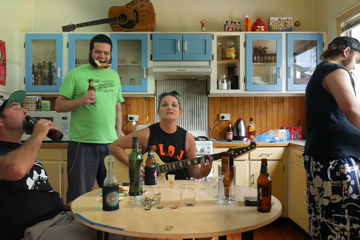...Really difficult.
I only have space in my woman-brain for two thoughts at a time: make-up and clothes. That’s it. I need everything else to be handed to me, whether it’s a curated Apple Music playlist or my roommate telling me what I’ll have for lunch.
Do you remember how in April this year it came out that you stop listening to new music by age 33? And then everyone got upset and was like ‘Nah, people in their 30s are still cool,’ and that was that? Well now we’ve got the same thing — except this time the impetus is Apple Music exec Jimmy Iovine on CBS This Morning explaining that Apple Music’s playlists make it easy for women to find new tunes: “I always knew that women find it very difficult at times.” The backlash has so far been strong, but let’s put this gaffe in context.
How do people find new music anyway? Apple Music, Spotify’s Discover Weekly, all those things, yeah, they can be good. So can the radio. So can word-of-mouth (your best bud’s mouth in particular, or your brother, sister, mother, father, cousin, whoever), your friendly neighbourhood street press, and other communities of people who share the things that they like with other people they reckon might like it too.
But these communities exist within a particular social context, a social context where overwhelmingly the higher-ups are male, where they are barriers to women’s equal participation. We don’t need a man to help us find the next new buzz act, to help us discover new music because we struggle to turn on the radio or whatever, to essentially babysit us so we get to feel relevant or something — we need a man to hire a woman, give them a leg-up, and then pay them equally. We need more women making music, writing music criticism, at record labels, at radio stations, being visible in the world, and thus curating that world for women. Because discovering new music doesn’t occur in a vacuum.
Don't miss a beat with our FREE daily newsletter
In 2015, we live in a world where a song by a woman is only deemed worthy of the national broadcaster when covered by a man. We live in a world where there are way more male performers than women, according to stats from APRA. We live in a world where men still review women’s records and live shows by talking about how they look, and box them in as “feminine”, then ask women dumb questions in interviews. We live in a world where women are literally assaulted at live shows. The tweets received by Jessica Hopper (Gals/other marginalized folks: what was your 1st brush (in music industry, journalism, scene) w/ idea that you didn’t “count”?) and then Junkee this week say it all really.
I’ve got my own stories, whether about bands treating me differently because I’m a young female writer, expecting a “groupie”, or the kind of gendered responses I get when I dare air an opinion online. I’ve been attacked for the way I look, threatened with sexual violence, told I’m a “worthless cunt” for spending years writing about gender, and music, and culture. Luckily, these experiences are few and far between; I don’t deal with a daily attacks and for that I’m thankful.
Women interested in music, women in the music industry, women in general, don’t need men telling them they’re unable to do certain things, like find new music. What we need is more initiatives like online community One Of One, #FreeToMove and The Push’s mentorship program, more memoirs from women pushing the boundaries of popular music (Carrie Brownstein, Kim Gordon et cetera) and talking frankly about the way they’re treated, and more people like Jessica Hopper, the author of The First Collection Of Criticism By A Female Living Rock Critic, and Anwen Crawford, standing up and saying that women’s expertise needs to be acknowledged. Because it’s not. And we’re sick of it.
Hopper said it best at BIGSOUND: “We’ve lost sight of the capacity young women have to anticipate, sustain and add cultural value to the experience of music.”
Want music recommendations? Go talk to one of the brilliant women in the music industry and see what’s on their radar. Don’t let a company that talks down to women “discover” Sampa The Great/Coda Conduct/Little May for you, as if you’re a person who doesn’t have ears.















